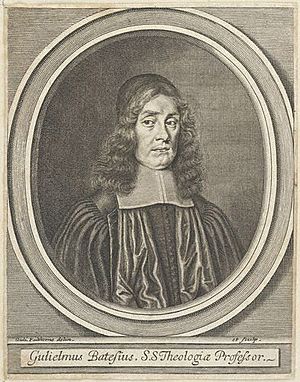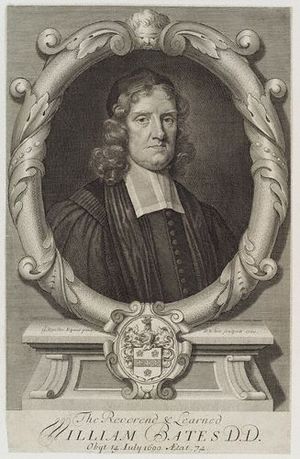William Bates (minister) facts for kids
William Bates (1625–1699) was an important English minister. He was a Presbyterian, which was a type of Protestant Christian. He lived during a time when there were many changes in England, especially about religion. Bates was known for his calm nature and his efforts to bring different religious groups together.
Contents
Life of William Bates
William Bates was born in London in November 1625. He went to Cambridge University, studying at Emmanuel College and later at Queens' College. In 1647, he earned his first degree. He became a Presbyterian minister.
His first church was St. Dunstan's-in-the-West in London. He worked there until 1662. That year, a law called the Act of Uniformity 1662 was passed. This law made many rules for church services. Because Bates did not agree with these rules, he was "ejected." This meant he lost his job as a minister. He also helped lead special morning talks at Cripplegate church.
Working with the King
Bates helped with talks to bring King Charles II back to the throne. The King liked Bates and made him one of his royal chaplains. This was a special role as a religious advisor to the King. In 1660, Bates was part of the Savoy conference. This was a meeting to discuss changes to the prayer book.
In 1661, Cambridge University gave him a special degree. He became a Doctor of Divinity (D.D.). He was also asked to become a "dean" at a church in Lichfield. But like other ministers such as Richard Baxter and Thomas Manton, he said no. He did not want to take a job that would make him follow rules he disagreed with.
Efforts for Peace
Later, Bates talked with important church leaders. These included John Pearson and Peter Gunning. They discussed ways for nonconformists to fit into the Church of England. Nonconformists were Protestants who did not follow the Church of England's rules.
In 1665, Bates took an oath in Oxford. He promised not to try to change the government or the church. Other ministers like John Howe agreed with him. But Richard Baxter refused to take the oath.
In 1668, some church leaders tried to find a way for Presbyterians to rejoin the Church of England. Bates, Baxter, and Manton worked together on this plan. But they could not reach an agreement.
Bates also asked the King to help nonconformists. The King was kind to him, but nothing changed. In 1674, another attempt was made to bring groups together. Bates was involved again, but it did not work out.
Later Life and Legacy
When King James II became king, nonconformists faced more problems. Bates stood by Richard Baxter when he was treated badly by a judge. Bates also helped a bishop named Nathaniel Crewe. He asked Archbishop Tillotson to protect him.
When William III and Mary became King and Queen, Bates spoke to them. He spoke on behalf of the dissenters. Dissenters were another name for nonconformists.
In his last years, Bates was a pastor in Hackney. He died there on July 14, 1699, at age 74. He had lived longer than many of his friends and preached at their funerals. People said he was a "silver-tongued" preacher. This meant he was a very good speaker.
Works of William Bates
William Bates wrote many books and sermons. His writings were collected and published in 1700. Here are some of his important works:
- Harmony of the Divine Attributes (first published around 1674)
- Considerations on the Existence of God and Immortality of the Soul (1676)
- Four Last Things–Death, Judgment, Heaven, and Hell (1691)
- Sermons preach'd on Several Occasions (1693)
- Spiritual Perfection (1699)
- Vitae Selectorum aliquot Virorum qui doctrina, dignitate, aut pietate inclaruere (1681) - This book contains the lives of famous religious leaders, written in Latin.
- The whole works of the Rev. W. Bates (IV volumes) (printed in 1815)
- Joint author of The Attributes of God (1835)
- A funeral-sermon for the Reverend, holy and excellent divine, Mr. Richard Baxter, who deceased Decemb. 8, 1691 : with an account of his life (1692)
- An account of the life and death of Mr. Philip Henry, minister of the gospel near Whitchurch in Shropshire, who died 24 June 1696, in the sixty fifth year of his age ; with Dr. Bates's dedication (1797).
 | Audre Lorde |
 | John Berry Meachum |
 | Ferdinand Lee Barnett |



